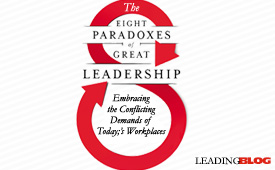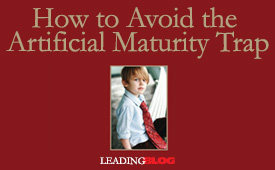Are You Mature?
 T
TIM ELMORE of
GrowingLeaders.com wrote an interesting article for his monthly
Leadership Link newsletter, about maturity. He noted that for the most part, “this generation of kids is advanced intellectually, but behind emotionally.” Intellectually they are exposed to much more sooner than we ever were growing up. But their emotional development is stunted by well-intention parents that hover over their kids—sometimes referred to as
helicopter parents—and deny them the necessary pain of maturation.
He also cited another reason. Scientists have found that from ages 11-14, kids lose some of the connections between cells in the part of their brain that enables them to think clearly and make good decisions. The brain is pruning itself. It’s ridding itself of ineffective and weak brain connections. This creates a situation where the brain is between the child brain and the not fully developed adult brain which forms around age 20.
Elmore asks, “What does this mean?”
Students today are consuming information they aren't completely ready to handle. The adult part of their brain is still forming and isn't ready to apply all that our society throws at it. Their mind takes it in and files it, but their will and emotions are not prepared to act on it in a healthy way. They can become paralyzed by all the content they consume. They want so much to be able to experience the world they've seen on websites or heard on podcasts, but don't realize they are unprepared for that experience emotionally. They are truly in between a child and an adult.
Elmore lists the qualities that we should begin developing in our own kids (and we might look for in ourselves).
- They are able to keep long-term commitments.
One key signal of maturity is the ability to delay gratification. They can commit to continue doing what is right even when they don't feel like it.
- They are unshaken by flattery or criticism.
As people mature, they sooner or later understand that nothing is as good as it seems and nothing is as bad as it seems. Mature people can receive compliments or criticism without letting it ruin them or sway them into a distorted view of themselves. They are secure in their identity.
- They possess a spirit of humility.
Humility parallels maturity. Humility isn't thinking less of yourself. It is thinking of yourself less. Mature people aren't consumed with drawing attention to themselves.
- Their decisions are based on character not feelings.
Mature people--students or adults--live by values. They have principles that guide their decisions. Their character is master over their emotions.
- They express gratitude consistently.
I have found the more I mature, the more grateful I am, for both big and little things.
- They prioritize others before themselves.
A pathway out of childishness is getting past your own desires and beginning to live to meet the needs of others less fortunate.
- They seek wisdom before acting.
Finally, a mature person is teachable. They don't presume they have all the answers. The wiser they get the more they realize they need more wisdom.
* * *

Follow us on
Instagram and
Twitter for additional leadership and personal development ideas.



Posted by Michael McKinney at 07:30 AM
Permalink
| Comments (0)
| TrackBacks (1) | This post is about Personal Development










